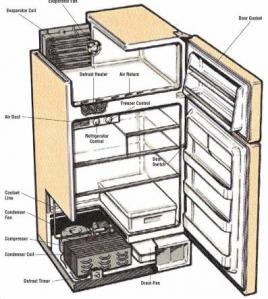| appliance resource center |
loud refrigerator? we hear ya
 If you’ve replaced your refrigerator within the last several years, your shiny new model might be making its presence known in noisier way.
If you’ve replaced your refrigerator within the last several years, your shiny new model might be making its presence known in noisier way.
Why?
For one, foam insulation — often used to make these appliances more energy-efficient — lacks the sound-baffling capabilities of fiberglass insulation incorporated into previous energy hogs.
Here’s some other “normal” sounds to expect, along with their abnormal counterparts:
Evaporator coil
A boiling, surging or gurgling sound as the compressor starts and stops. Also, a pop as the evaporator expands and contracts after defrosting.
Evaporator fan
The sound of air being forced through the unit is normal, but a continuous ticking or even intermittent squealing is abnormal.
Defrost heater
Sizzling or hissing sound from water dropping onto the heater during defrost cycle
Compressor
Newer fridges’ compressors are much more efficient and run much faster, giving off a high-pitched hum, whine or pulse. But watch out for clicking during start up (especially if the lights dim), banging or knocking during start or stop, a ping or snap followed by the compressor stopping.
Cold control and defrost timer
A snapping or ticking sound as the refrigerator turns on and off
Plastic liner
Cracking or popping as the temperatures change
Drain pan
Running water during or after the defrost cycle
Water valve
Buzzing, clicking or running water as the ice maker fills or water is dispensed
Ice maker
Cracking of ice and cubes dropping into the bin
Condenser fan
Air being forced over the condenser is normal, but squealing from the motor is abnormal.
Condenser
You should hear a surging or gurgling sound from the flow of refrigerant when the compressor runs, but an improperly placed drain pan could cause rattling.
If the normal sounds bother you, consider a piece of rubber-backed carpet for underneath the fridge. You could even put sound-absorbing materials inside the cabinet if the refrigerator sits in an enclosure.